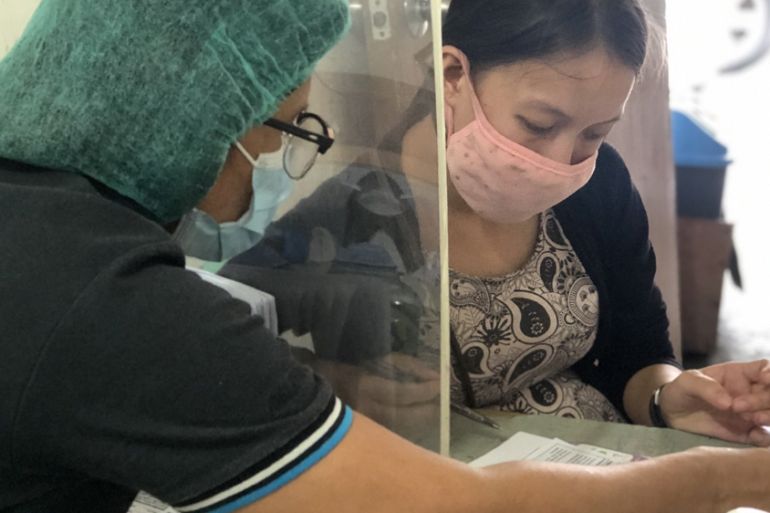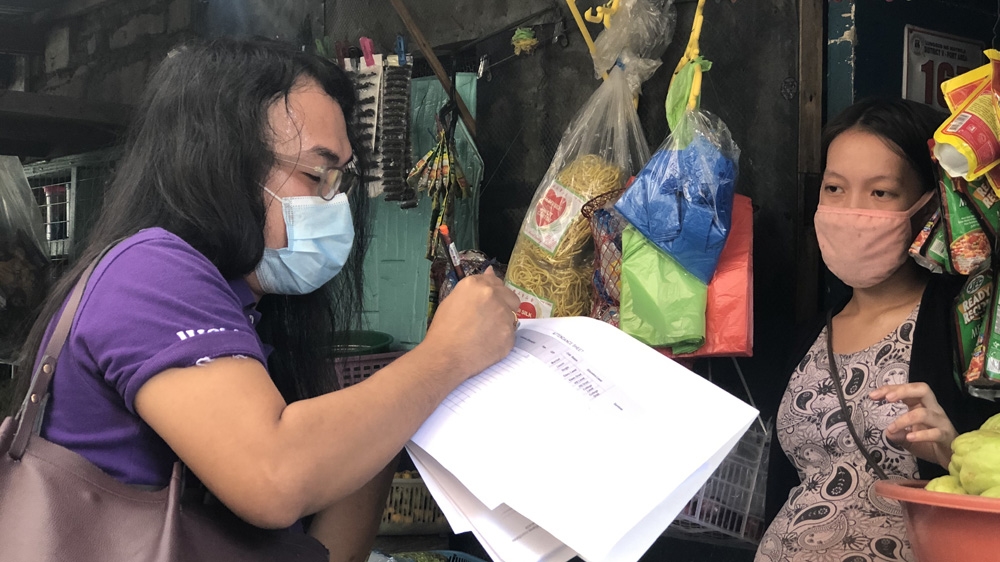Philippines faces baby boom after lockdown hits family planning
Confined to their homes by lockdown, women have also found it difficult to access family planning services.

Manila, Philippines – Before beginning her daily three-kilometre walk to the government health clinic where she works as a midwife, Stella Marie Alipoon packs a bottle of water for herself and birth control pills, condoms and injectables for the patients she is about to meet.
Alipoon has continued her rounds since mid-March when the Philippines government declared a strict lockdown to curb the spread of the coronavirus. Businesses and commercial establishments ceased operations, all forms of public transportation were suspended, and city borders were barricaded by checkpoints operated by police.
Keep reading
list of 4 itemsMexico’s teachers seek relief from pandemic-era spike in school robberies
‘A bad chapter’: Tracing the origins of Ecuador’s rise in gang violence
Why is the US economy so resilient?
The measures were meant to curtail the spread of the coronavirus – which causes the respiratory disease COVID-19 – but it also cut off the midwife’s patients in the city of Caloocan, about 8 kilometres (5 miles) north of Manila, from free birth control services and products.
“Patients found me on Facebook and messaged me asking me how they could access birth control,” Alipoon said. “Many couldn’t go to the clinic because there was no public transport – or they didn’t have money for the fare. Some weren’t sure if the clinic had closed during the lockdown and didn’t want to venture going out and risk getting infected.”
Since the women could not go to the clinic, Alipoon brought family planning services to them, meeting them along the highway to give them enough birth control pills and condoms to tide them over for two to three months. In one instance, Alipoon found a discreet spot behind a 7-11 convenience store to administer an injectable contraceptive.

“The women were desperate for birth control. Their partners were home all the time because of the lockdown and well, let’s just say they didn’t want the increased intimacy to result in an untimed pregnancy,” said Alipoon.
Baby boom
Globally, the United Nations Population Fund (UNFPA) estimates that more than 47 million women could lose access to contraception as a result of the coronavirus overloading health systems and disrupting global supply chains, which could result in about 7 million unintended pregnancies.
In the Philippines, experts say the lockdown means more than 5 million women in the Philippines are likely to find their reproductive health services disrupted.
More than 1.8 million unplanned pregnancies were already expected this year, and the University of the Philippines Population Institute (UPPI) and the UNFPA are predicting a coronavirus baby boom with an additional 751,000 unintended pregnancies if community quarantine measures continue until the end of the year.
“This would be the highest number of births in the country since 2012,” said Juan Antonio Perez III, executive director of the Commission on Population and Development (POPCOM).
According to POPCOM data, the number of births that year was 1.79 million and has been slowly declining as family planning services became more widely available.
But the lockdown is reversing the situation.
POPCOM says government health centres have seen a 50-percent drop in people using their services since March, mostly due to lack of public transport, limited clinical staff and reduced clinic hours.
A ravaged economy compelled the government to ease lockdown measures across the country on June 1, except for certain high-risk areas but, despite the relaxation, many are still afraid to leave their homes. In the past few weeks, the Philippines has recorded new daily COVID-19 cases in the thousands. As of July 12, there were 56,259 total cases, the second-highest in Southeast Asia.
New initiatives
In an effort to make reproductive health services easier to access, the health department in April launched Family Planning on Wheels, a programme where health workers visit various communities and hand out three months’ supply of their preferred birth control.

“The COVID-19 pandemic has shaken our health system, disrupting access to family planning. Through Family Planning on Wheels, we bring family planning to the doorstep of our clients,” health secretary Francisco Duque said in a press briefing last Friday.
Duque added that initial data showed the initiative led to an increase in the use of condoms and birth control pills.
But the nature of birth control, pregnancy and childbirth are complex and often unpredictable. In the dense urban slum community of Baseco, Manila, where Mildred Jamandron lives, the 24-year-old says the lockdown measures left her overwhelmed.
“I didn’t know where I could safely give birth. I discounted two hospitals because they handle COVID cases. I was scared to give birth there. A small birthing clinic wanted to charge me 11,000 Philippine pesos (about $220) which I couldn’t afford,” said Jamandron, a homemaker whose partner is a seafarer.
On June 4, when Jamandron began going into labour in the early hours of the morning, she contacted the Likhaan Center for Women’s Health, an organisation that provides free maternal healthcare. Likhaan community health workers dispatched their emergency vehicle and picked her up so she could give birth safely in their facility.
Mak Calsona, a community health worker with Likhaan, visited Jamandron last week in her home to check on the health of her newborn and give her advice about birth control options. Seated in the sidecar of a motorbike, she made her way through narrow streets in ankle-deep water caused by bad sewage and a high tide to reach Jamandron.
The driver of the sidecar charged her 40 Philippine pesos ($0.80) because of the distance and because they now accommodate fewer passengers in compliance with physical distancing measures. Usually, it would cost a quarter of that.
‘Double burden’
Calsona said women are suffering a “double burden” caused by the pandemic.
“On one hand, they are scared to go out to the clinics to get their birth control supplies and check-ups. On the other hand, they are scared to get pregnant during a pandemic that has made health and income security so uncertain,” she said.

After paying Jamandron a visit, Calsona met two other pregnant women and brought them to the Likhaan clinic for a check-up and to discuss their birth plan. Likhaan shouldered the cost of their transportation. “It seems like such a small amount – 40 pesos ($0.80) for transport. But that is just one way. When you think of having to pay for a return trip and the recurring cost to continue clinic visits, it adds up. It is a real barrier to accessing services.”
Jeanger Parane was one of those Calsona brought to the clinic that day.
The 14-year-old is in her seventh month of pregnancy and has not had any kind of prenatal check-up. The joint UPPI-UNFPA study indicates that some 18,000 more teenage girls could fall pregnant by the end of the year because of the COVID-19 measures.
Parane described being “surprised and afraid” of what her family would say when she first found out she was pregnant. Now, she is also confused. She tried to see a doctor twice. Once, the clinic was closed, and the other time, there was no doctor. Later she heard that some clinics were asking for a health check and a negative COVID-19 test before letting patients enter, so she stopped trying.
“I want to give birth in the hospital, but I just might end up giving birth at home. I guess I’ll just decide when the baby comes,” Parane said, shrugging.
The Jose Fabella Memorial Hospital in Manila is the country’s leading government maternity hospital. About a decade ago, the hospital saw as many as 40,000 births annually.
Hospital director Dr Esmeraldo Ilem says the combination of the small gains in contraceptive use and equipping more health centres to safely handle deliveries has reduced the number of annual births in Fabella by half.
But now the hospital is bracing itself for a coronavirus baby boom.
“We will handle many of those births. Right now, it is the gestation period,” Ilem said.